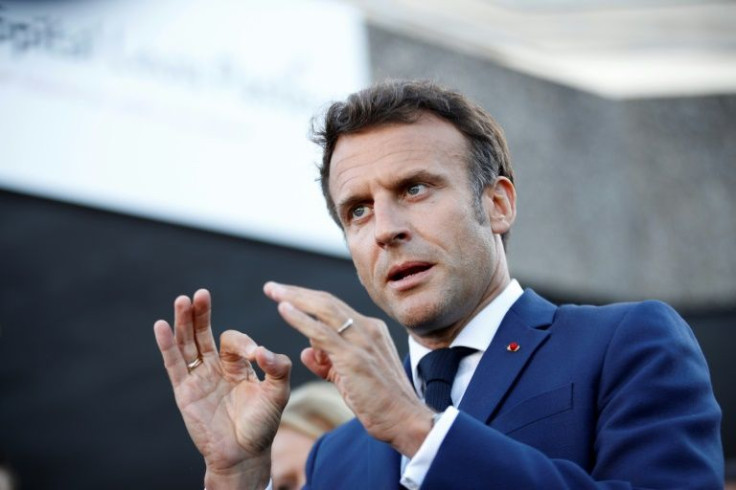Macron Faces Calls To Finally Make Ukraine Trip
For months, French President Emmanuel Macron has used a stock reply to questions about why he has not visited Ukraine since the outbreak of war there.
"I've always said the same thing," he told reporters in northern France on Tuesday. "At a time and in circumstances that are useful, I'll make the trip."
Having watched a succession of Western leaders visit Kyiv to greet President Volodymyr Zelensky in person since late February, Macron is now under growing pressure to follow suit to signal his support for the Ukrainian cause.
During March and April, he pointed to his packed schedule during campaigning for re-election and ruled out using the bombed-out streets of the Ukrainian capital as a cynical photo opportunity.
But having secured a second term on April 24, his reluctance to follow in the footsteps of British Prime Minister Boris Johnson, Canada's Justin Trudeau, or EU chief Ursula von der Leyen has led to growing questions.
Travel to Ukraine is admittedly complicated by the closure of airspace to passenger traffic but this has not stopped others boarding Ukrainian trains from Poland.
Why not make the journey from Paris? And when will the 44-year-old, who likes to make a splash with his foreign trips, decide that his presence is "useful"?
Ukrainian Foreign Minister Dmytro Kuleba made Kyiv's desire explicit on Tuesday, saying that "it would be good that Macron came during the French EU presidency."
Paris holds the six-month rotating presidency of the European Union until the end of June.
"He could have done it the day after his election. It's time that he does it now," former French president Francois Hollande, a frequent critic, told the BFM TV channel on Wednesday.
French foreign policy expert Francois Heisbourg said that the leaders of France, Germany and Italy have been conspicuous by their absence in Kyiv so far.
"The three that have not gone are highly noticeable, and they are the three tarred with the 'accommodationist' word," the senior adviser at the International Institute for Strategic Studies, a think-tank, told AFP.
Rightly or wrongly, they are suspected of being eager to secure a deal to bring a quick end to the fighting, Heisbourg said, although Macron has always stated that the terms of any settlement were up to Ukraine.

The French leader has attempted to serve as a bridge between Ukraine and Russia, visiting both capitals in February before the war and spending hours on the phone with Russian President Vladimir Putin and Zelensky.
This has led him to appear to be on a different track to other more critical countries such as the US, Britain and eastern European countries which have denounced Putin and his alleged war crimes.
Macron has argued against "verbal escalations" and in May he warned against the "humiliation" of Moscow in any settlement to the conflict.
"I don't believe France is trying to 'appease Russia'... but the absence of a Macron visit is still very odd," former British ambassador to France, Peter Ricketts, wrote on Twitter recently.
Zelensky has occasionally appeared critical of his French counterpart, once suggesting that Macron was scared of Putin and saying his talks with the Russian leader were "in vain".
"I know he wanted to get results from mediation between Russia and Ukraine, but he didn't get any," Zelensky told an Italian channel in mid-May.
Macron sees any criticism of France as unfair, pointing to deliveries of sophisticated French-made Caesar artillery and anti-tank weapons, as well as vocal support for sanctions on Russia.
He has always argued that he only speaks to Putin at the request of Zelensky or in close coordination with him, and that the communication channel to the Kremlin is worth conserving.
France's new Foreign Minister Catherine Colonna was dispatched to Ukraine on Monday as a symbol of support.
"France has nothing to be embarrassed about in terms of its commitment to Ukraine," said Marie Dumoulin, a former French diplomat and expert at the European Council on Foreign Relations.
She said she was "surprised" that Macron had not made Kyiv his first trip post-election, however.
The opportunity to visit might come later this month on a date near a June 23-24 EU summit when Ukraine's request to join the 27-member bloc will be examined by members.
"It's not indifference, or condescending," a French presidential adviser explained to AFP about Macron's decision to stay away from Kyiv so far.
"He's not going to go there just to do a selfie, but for something concrete."
© Copyright AFP 2024. All rights reserved.







